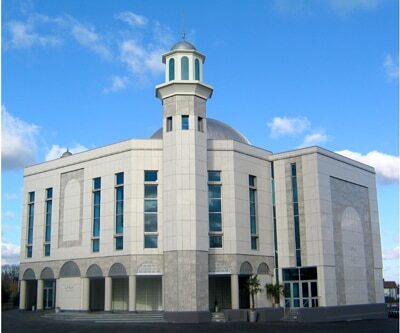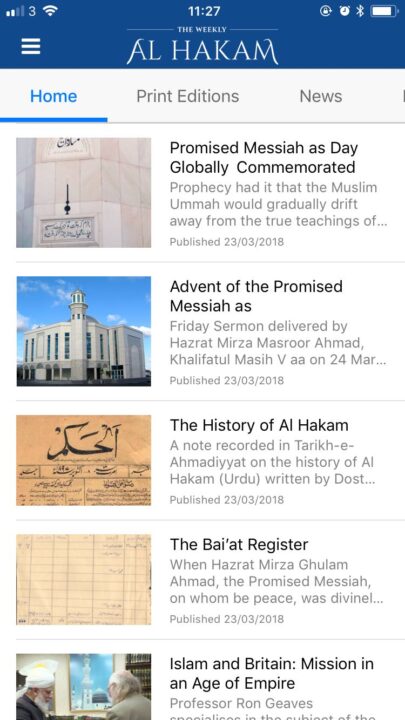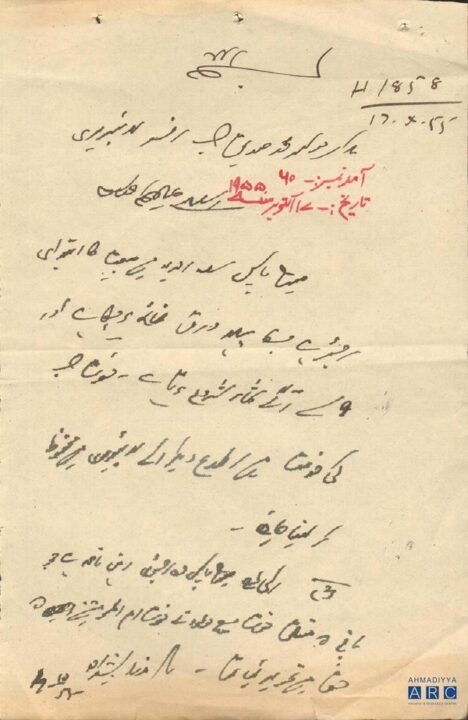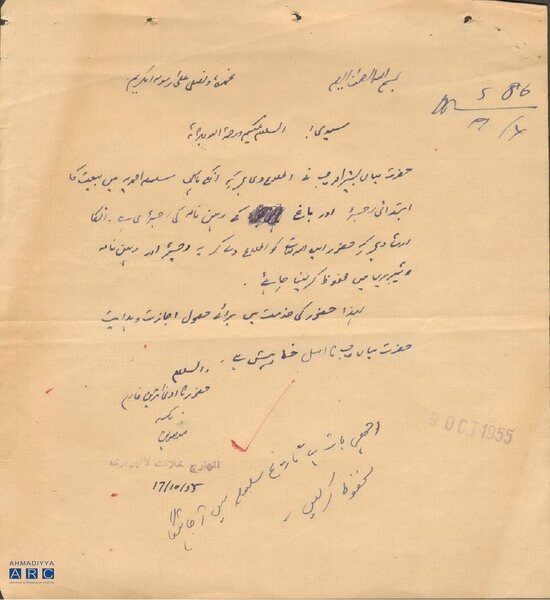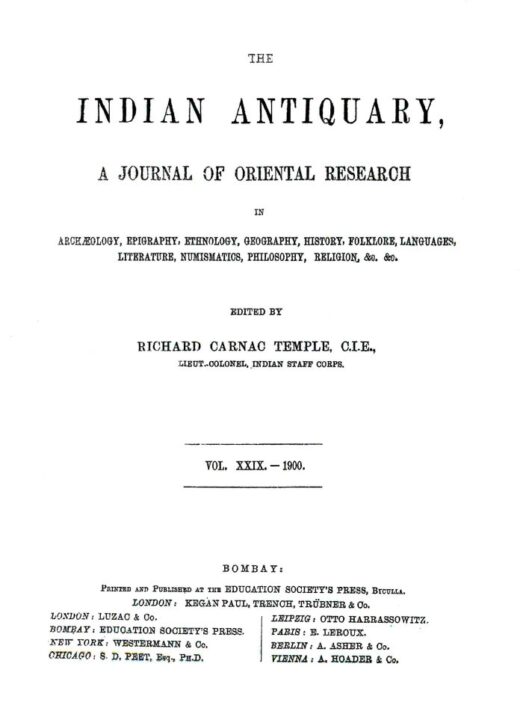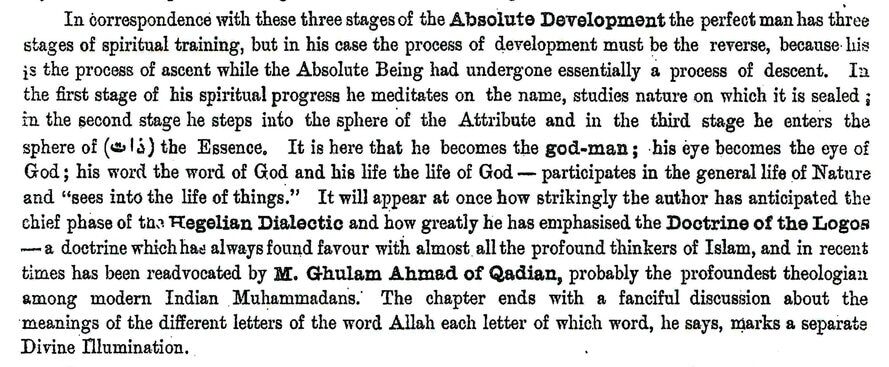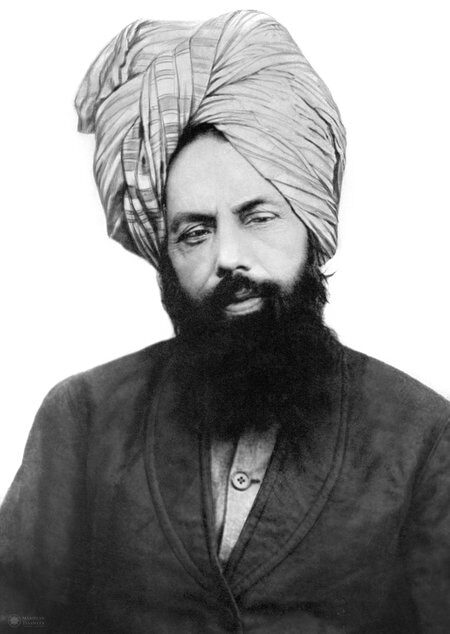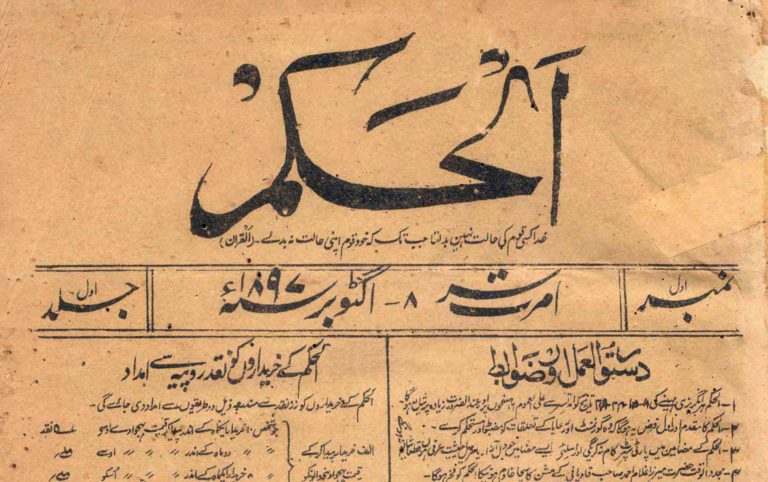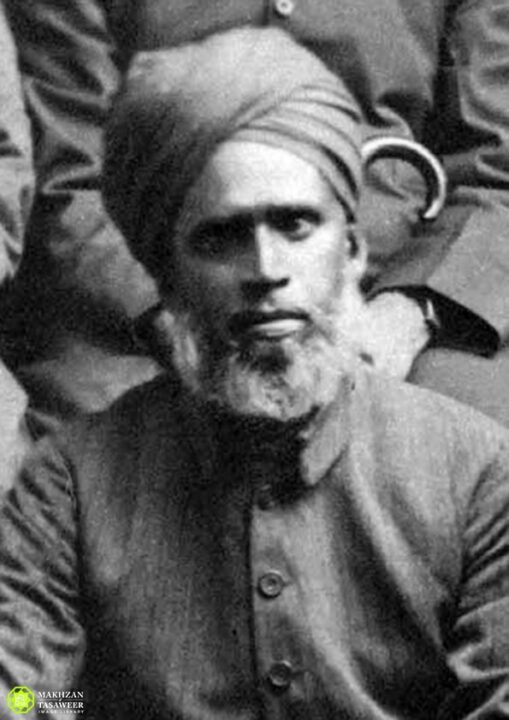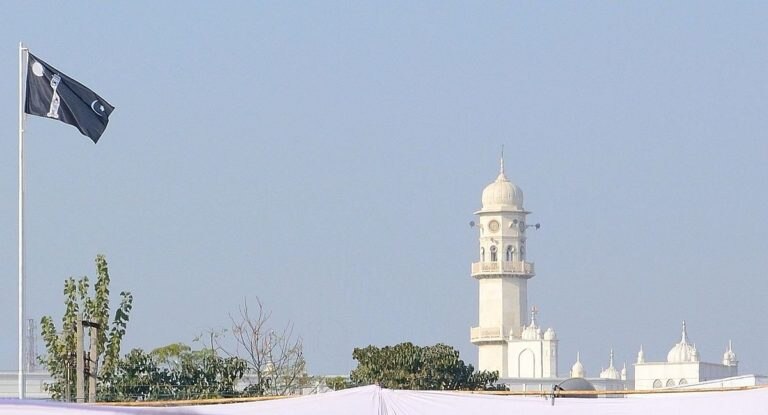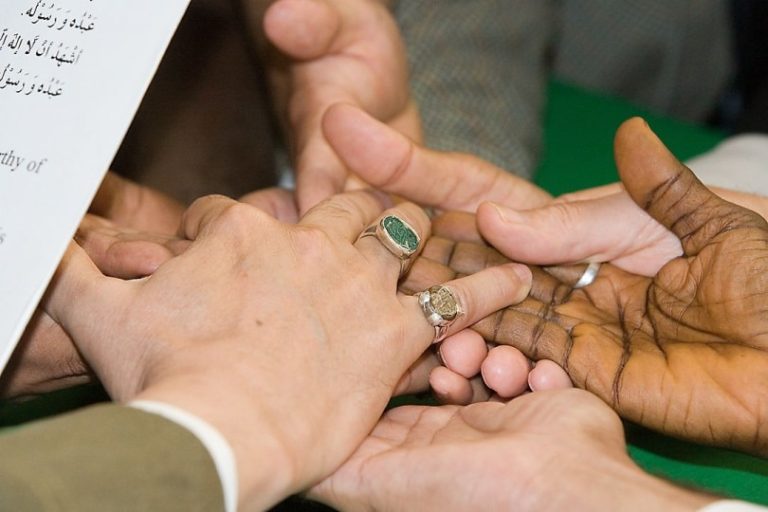Friday Sermon
24 March 2017
Advent of the Promised Messiahas
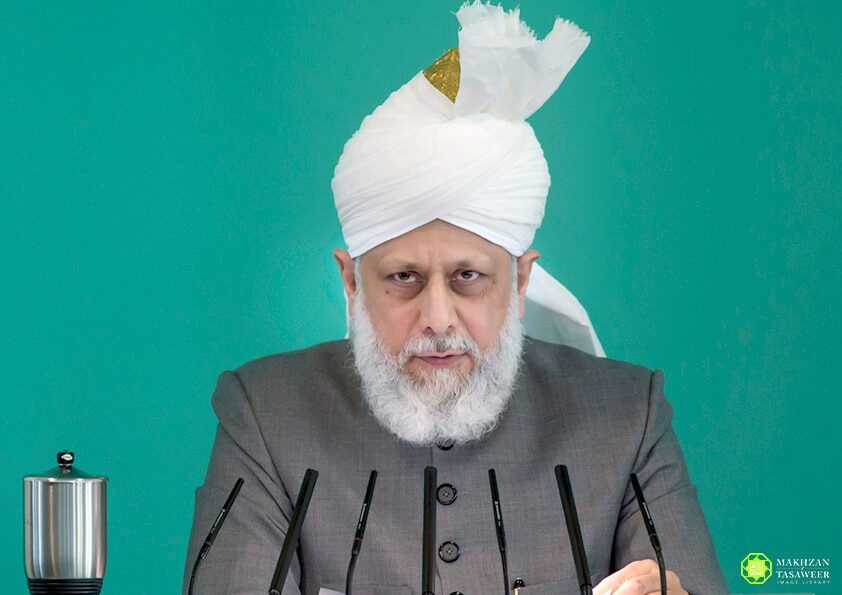
After reciting Tashahhud, Ta’awwuz, Tasmiyah and Surah Al-Fatihah, Hazrat Amirul Momineenaa said:
Yesterday was 23rd of March and in the history of Ahmadiyyat this day is highly significant because on this day the Ahmadiyya Community was officially established by the Promised Messiahas through the system of Bai’at [oath of initiation].
The Promised Messiahas announced, “The prophecy of the Holy Prophetsa regarding the awaited Messiah and Mahdi [the Guided one] has been fulfilled through me.”
The Promised Messiahas stated:
“I have been sent to instil the love of God in the hearts [of the people] by establishing the oneness of God Almighty.”
The Promised Messiahas continues by saying:
“God Almighty wishes to draw all the pure natured souls towards Himself – whether they reside in Europe, Asia or any other part of the world for that matter – and He wishes to demonstrate His Oneness by guiding the people towards one faith. This is God Almighty’s objective for which I have been sent to this world. Therefore, you should follow this objective but one must always keep kindness, conduct and prayers in mind.” (Risala Al-Wasiyyat, Ruhani Khazain Vol.20, pp. 306-307)
The Promised Messiahas then further states:
“I have been bestowed this rank and status through complete submission and [my] true love for the Holy Prophetsa. That is why this message is for the entire world; that everyone should love this prophet and follow him. Through this, one will be able to form a connection with God Almighty and become a true believer that adheres to the Oneness of God.”
The Promised Messiahas continues by saying:
“The sons of Adam have no Messenger and Intercessor but Muhammad, the Chosen One, peace and blessings of Allah be upon him. Endeavour therefore, to cultivate true love for this Prophet of glory and majesty, and do not give precedence to anyone over him, so that in heaven you may be counted as those who have attained salvation. Remember, salvation is not something that will be manifested after death. On the contrary, true salvation exhibits its light in this very world. Who is the one who attains salvation? Such a person is he who believes that God is true and that Muhammad, peace and blessings of Allah be upon him, is the Intercessor between God and all His creation, and that under the heaven there is no Messenger equal in rank to him, nor is there any book equal in status to the Quran. God did not desire that anyone should remain alive eternally, but this Chosen Prophet lives forever.” (Kashti-e-Nuh, Ruhani Khazain Vol.19, pp. 13-14)
This is the status and love the Promised Messiahas had for the Holy Prophetsa, which he openly expressed and always urged his followers to be mindful of this rank and love. Those people who assert that we consider the status of the Holy Prophetsa to be inferior to the Promised Messiahas (heaven forbid) are guilty of a grave injustice. Even at present, this very allegation is being used against Ahmadis in Algeria and as a result of it they are being thrown in jail. To the extent that now they have even detained women and begun filing law suits against them. Women along with their young babies, who are a few months old and only drink [their mothers] milk, are made to travel for hours to reach another city, where they face prosecution and jail. However, the message I am receiving from those women is the same, and that is, “We have accepted the Promised Messiahas and only after this have we understood the true meaning of Tauheed [the Oneness of God] and also the true rank and status of the Holy Prophetsa and what it means to have love for him. How then can we revert from our faith?”
Whilst we pray for Ahmadis to be relieved of their difficulties in that country, at the same time we also pray to God Almighty for Him to grant the Muslims the opportunity to accept the ardent devotee of the Holy Prophetas; the one who was sent to establish the Oneness of God and also responsible for the spread of the revival of Islam. One can observe the Promised Messiah’sas love for God Almighty and his desire to spread the Oneness of God from the following words. Whilst addressing God Almighty, the Promised Messiahas states:
“[Dear Lord] Behold! My soul ascends towards Thee with the utmost certainty, just as a bird soars towards its nest. Thus, I desire from Thee a sign of Thy existence, not for the sake of my honour and nor for any personal gain, rather so that people recognise Thee and identify Thy virtuous paths, lest they deviate from guidance by declaring the one who has been sent to be false. I bear witness that Thou hast sent me indeed and Thou hast bestowed countless signs for my truthfulness, to the extent that Thou commandest the sun and the moon to eclipse in the month of Ramadan, in accordance with the dates mentioned in the prophecy. I have recognised Thee, and Thou art my Lord. Therefore my soul rushes towards Thee just as a suckling baby leaps towards its mother upon seeing her. Alas! The majority of the people have not recognised me, nor have they accepted me.” (Tiryaqul Qulub, Ruhani Khazain, Vol. 5, pp. 115)
From this, we can see the love of God and the Promised Messiah’sas yearning to establish His grandeur, and at the same time one can clearly see his urge to save humanity, and why would he not be; for he was the one sent in the latter days in subservience to the Holy Prophetsa, in order to instil the love of God Almighty in the hearts of the people. He not only established this, but he himself was absorbed in the love of God Almighty. He had a deep yearning for the spark of the ardent love of God Almighty to be ignited in the hearts of the people. With regards to this the Promised Messiahas states:
“How unfortunate is the man, who even now, is unaware that there is a God who has power over all things. Our paradise lies in our God. Our highest delight is in our God for we have seen Him and found every beauty in Him. This wealth is worth procuring though one might have to lay down one’s life to procure it. This ruby is worth purchasing though one may have to lose oneself to acquire it. O ye, who are deprived! Hasten to this fountain as it will satiate you. It is this fountain of life that will save you. What am I to do? How shall I impress the hearts with this good news? What sort of a drum am I to beat in the streets in order to make the announcement that this is your God, so that people might hear? What remedy shall I apply to the ears of the people so that they should listen?” (Kashti-e-Nuh, Ruhani Khazain, Vol. 19, pp. 21-22)
Observe how much pain is wrapped in the layers of these words, rather it is more fitting to say that there are several aspects to the agony attached to every single word. Each word contains tiers, and each tier contains a pain that each individual can understand according to their own level of intellect and understanding. Thus, in relation to each individual’s understanding, whichever layer one is able to grasp, they will reach extraordinary heights and make remarkable spiritual progress.
Whilst advising us on the worship of God Almighty and attaining His love, the Promised Messiahas stated:
“If you become one with God, rest assured that God too will be yours. God Almighty shall remain awake for you as you sleep. God shall watch over your enemy and frustrate their designs, while you are unmindful of Him. You still do not know the extent of God’s powers. Had you known, not a single day would you have grieved over the world. Does he who owns a treasure weep, cry and become sorrowful unto death over the loss of a single coin? Had you been aware of this treasure and known that at every time of need God is able to fulfil your requirements, why would you look to the world so restlessly? God is a precious treasure; appreciate Him accordingly, for He is your Helper at every step. You are nothing without Him, nor do your resources and your schemes amount to anything. Do not follow other people for they have become wholly reliant on material means. Just as a snake devours dirt, they consume the filth of inferior worldly means. They gorge themselves on carrion in the manner of vultures and dogs. They have become estranged from God.”
The Promised Messiahas further states:
“I do not forbid you to employ material means within moderation…” (He does not forbid one to work, gain benefit from material objects or to use them)
“…only that you do not become slaves to them like other nations and that you do not forget the God Who is the very Provider of these means…” (All these resources and material objects are provided by Him, one should not become infatuated by them, rather one should look towards God Almighty, the Provider of everything)
“…Had you possessed insight, you would have seen that God is everything and all else is nothing.” (Kashti-e-Nuh, Ruhani Khazain Vol. 19, pp. 21-22)
Thus, this is the level of the relationship we must form with God Almighty and maintain. This was the desire the Promised Messiahas had for his followers. As I mentioned previously, the Promised Messiahas received the responsibility of establishing the Oneness of God and the revival of Islam because of his complete submission and ardent devotion of the Holy Prophetsa.
There are countless incidents that express this love and affection. One such incident has been narrated that “On one occasion the Promised Messiahas was strolling on top of Masjid Mubarak on his own. He was humming something while at the same time tears were falling from his eyes.”
When a person enquired as to why the Promised Messiah as was so perturbed, he replied by saying: “I was reading the couplet of Hassan bin Thabit which he wrote at the demise of the Holy Prophetsa. The couplet was:
کنتَ السوادَ لناظری
فعمِیَ علیک الناظر
من شاء بعدکَ فلْیمتْ
فعلیکَ کنتُ اُحاذِرُ
“O Muhammad, you were [like] the pupil of my eye which has been blinded since your demise. Whosoever may depart henceforth, for I feared your death alone.”
The Promised Messiahas said, “While reading this couplet, I wished in my heart that it was I who had composed this couplet.” The tears flowing down from the Promised Messiah’s eyes illustrated the state of his heart. Those who level allegations against the Promised Messiahas that, God forbid, he considered himself superior in rank to the Holy Prophetsa cannot even come close to the deep love and affection the Promised Messiahas had expressed for the Holy Prophetsa.
Hazrat Mirza Bashir Ahmadra sahib has described this emotional state of the Promised Messiahas in the following heart-rending manner:
“The Promised Messiahas faced all kinds of difficulties and troubles, many a times he had to face a storm of opposition, experienced countless amount of suffering and torment and was [falsely] put on trials for murder. He witnessed the demise of his relatives, close relations, friends and even children and yet never did his close ones ever witness his countenance expressing the state of his heart. However, when it came to the occasion of expressing his love for the Holy Prophetsa, his eyes flooded with tears.” (Seerat-e-Tayyaba, Hazrat Mirza Bashir Ahmadra, pp. 28-30)
There are countless examples in the books and various sayings of the Promised Messiahas which illustrate the deep love he had for the Holy Prophetsa. Listening to the opponent’s mockery against the Holy Prophetsa, once the Promised Messiahas expressed his heartfelt emotions. The Promised Messiahas stated:
“Nothing has caused more pain to my heart than their mockery of the Holy Prophetsa. Their hurtful insults and slander against the Holy Prophetsa has caused great pain to my heart. I swear by God that if all my progeny and the progeny of my progeny, all my friends, all those who offer their help and assistance to me were killed before my eyes, and my own hands and feet were cut off and the pupils of my eyes were gorged out, and I am to be deprived of all my desires and made to lose my happiness and comforts, it would not pain my heart as it has been pained by the foul attacks made on the noble character of the Holy Prophetsa. Thus, O Lord of the Heavens! Bestow upon us Your mercy, and help and save us from this great trial.’ (Aaina-e-Kamalat-e-Islam, Ruhani Khazain, Vol. 5, pp. 15) (Seerat-e-Tayyaba, Hazrat Mirza Bashir Ahmadra, pp. 43-44)
Is there anyone who can express such kind of emotions? There are many who profess their love and affection. There are many who create disorder and unrest in the name of Namoos-e-Risaalat [honour of the Holy Prophetsa] and Khatm-e-Nabuwat [seal of the prophets]. However, what efforts have they made in order convince the world of the Holy Prophet’s true status and for spreading the message of Islam and the Holy Quran? The words of the Promised Messiahas are not just merely a claim, in fact those who knew him and strangers alike, testified that his love for the Holy Prophetsa was evident from the chords of his heart and every action of his. Thus, upon the demise of the Promised Messiahas, a non-Ahmadi newspaper from Amritsar, Vakeel, wrote:
“Despite having extreme doctrinal differences, the demise of Mirza Sahib has made the Muslims – rather the enlightened Muslims – realise that a prominent personality has departed from them. Also, the superb defence of Islam that was bonded with his personage has also come to an end after his demise.”
It further stated:
‘Now, after completing his work, one has to acknowledge the eminence and greatness of Mirza Sahib’s literary works. In future, no matter how extensive our efforts are for the defence of Islam, it is impossible to disregard the writings of Mirza sahib. The defence of Islam is not possible without the writings of Mirza sahib.’ (Taken from Seerat-e-Tayyaba, Hazrat Mirza Bashir Ahmadra, pp. 45-46)
This was all done by the Promised Messiahas and was done in order to establish that Islam is the everlasting and perfect religion of Allah the Almighty. It was done owing to his deep love for the Holy Prophetsa and to establish the great and true status of the Holy Prophetsa. He proved to the world and all the religions of the world that there is no religion like the religion of Muhammadsa.
Those who level allegations against the Promised Messiahas should at least read and ponder over the deep love he had expressed for the Holy Prophetsa. Otherwise, to simply level an allegation for the sake of argument, is a sign of complete ignorance. Like a loyal disciple and a grateful servant, the Promised Messiahas said that everything he has attained is in fact due to his master, the Holy Prophetsa, and by following his noble example. Thus, expressing this, the Promised Messiahas states:
“I swear by Allah the Almighty that just as God Almighty spoke to Abraham and then Isaac, Ismael, Jacob, Joseph, Moses and Jesus son of Mary and then the Holy Prophetsa, upon whom He bestowed His most illumine and pure revelation, in the same way He has spoken to me. However, this honour has been bestowed upon me due to my subservience to the Holy Prophetsa. If I was not among the followers of the Holy Prophetsa and did not follow his blessed model then even if my deeds were as high as a mountain, I would never have been honoured with this kind of divine communication.’ (Tajalliyat-e-Ilahiya, Ruhani Khazain, Vol. 20, pp. 411-412)
After hearing all of this, if someone still levels allegations against the Promised Messiahas then what more can be said other than that such a person is unjust, ignorant and seeks to create disorder. Those who consider themselves to be “great scholars”, their matter lies with Allah the Almighty. The purpose of the advent of the Promised Messiahas was to not only establish the Tauheed [Oneness of God] and inform the world of the true status and rank of the Holy Prophetsa, thereby bringing them into the fold of Islam, but also to fulfil the rights of God Almighty’s creation and to develop a cognition for showing compassion to His creation and also to demonstrate this through their practice. Thus, in the ten conditions of Bai’at, there are two conditions which are directly linked to this. The Promised Messiahas states in the fourth condition:
“That under the impulse of any passions, he/she shall cause no harm whatsoever to the creatures of God in general and Muslims in particular, neither by his/her tongue, hands, nor any other means.”
And then in the ninth condition:
“That he/she shall keep himself/herself occupied in the service of God’s creatures for His sake only and shall endeavour towards the beneficence of mankind to the best of his/her God-given abilities and powers.” (Izala-e-Auham, Ruhani Khazain, Vol. 3, pp. 564)
Speaking about the Islamic teachings in this regard, the Promised Messiahas states:
“There are two aspects of faith. Firstly, it is to love Allah the Almighty and secondly to love mankind to the extent wherein one considers their troubles as if they were his own and thus pray for them.” (Naseem-e-Da’wat, Ruhani Khazain, Vol. 19, pp. 464)
The Promised Messiahas further states:
“In respect to the teachings of Islam, it has two aspects, or it can be said that the teachings of Islam comprises of two main objectives. Firstly, to believe in one God and to believe in Him in the manner that He truly exists. Moreover, to show complete love to Him and devote oneself in His obedience as is required from one in obedience and love.”
The Promised Messiahas further stated:
“The second objective is to spend all of one’s faculties, strengths, capacities and abilities to serve His creation and treat them with sympathy, and to be extra grateful and benevolent in return to all those who do good to him, whether it be a king or the simplest of men.” (Tohfa-e-Qaisariyya, Ruhani Khazain, Vol. 12, pp. 281)
Thus, this is the teaching in regards to how one should deal with His creation after having professed one’s love for Allah the Almighty. Or rather, it is owing to one’s love for Allah the Almighty which then draws one’s attention towards serving His creation. However, what was the Promised Messiah’s own condition and practice in respect to this? Explaining this, the Promised Messiahas states:
“I would like to inform all the Muslims, Christians, Hindus and Aryas that I do not bear enmity with anyone. [I.e. he does not deem anyone to be his enemy even those who oppose him.] The love I have for the whole of mankind is like the love a benevolent mother has for her children, in fact even more. I am only an enemy of the false doctrines which obliterate the truth. To show sympathy to mankind is my duty and to shun: falsehood, Shirk, cruelty, ill-practice, injustice and immorality, are my principals.’ (Arba’een, Ruhani Khazain, Vol. 17, pp. 344)
Further elaborating on this, the Promised Messiahas states:
“It is evident that every species loves its own kind, even ants love other ants, providing there is no other selfish motive. Thus, it becomes the duty of the person who invites others to Allah the Almighty [the Promised Messiahas was calling people towards God Almighty] that he should love them the most. Hence, I love mankind the most but I am only an enemy of their ill-practices, injustices, disorder and rebellious behaviour. I bear no personal enmity with anyone. Thus, the treasure which has been bestowed upon me is the key for acquiring the treasures and rewards of heaven and I present that before mankind owing to my intense passion of love. The wealth that has been afforded to me is in fact the likes of precious diamonds, gold and silver and is not something that is spurious and debased. These treasures can be identified very easily because these Dirhams and Dinars [coins] bear the royal seal of the Sultan. (Who is this Sultan?) It is the heavenly testimonies which no one else possesses. (Allah the Almighty helps me and testifies for me.) I have been told that of all the religions, Islam is the true one. Out of all the guidance only the Guidance in the Quran remains in a perfect state and free from human interpolation. It has been explained to me that out of all the Messengers, the one who brought teachings which are perfect, superlative and unmatched in wisdom, teachings which display the qualities for the best example of man’s life, is none other than the chosen one, Muhammad, peace and blessings of Allah be upon him. And I have been informed through the holy and pure revelation of God, that I have been sent by Him as the Promised Messiah and Imam Mahdi and I am the arbitratorof internal and external differences. These names that I have been granted, namely the ‘Messiah’ and the ‘Mahdi’ have been bestowed to me by the Holy Prophetsa. Furthermore, God Almighty bestowed to me these names through divine discourse and the need of the time warrants that I should be granted this name.” (Arba’een, Ruhani Khazain, Vol. 17, pp. 345)
The Promised Messiahas did not merely write all of this down [and left it that] and nor did he simply make a verbal claim that he has the most love for all mankind. Rather we observe how he practically demonstrated this love during his lifetime. We see how when he makes the claim to be the Promised Messiah and Mahdi, God Almighty revealed signs to attest this claim. Some of these signs were displayed in the form of calamities and natural disasters and this caused the Promised Messiahas to become restless and anxious. Maulvi Abdul Karim sahib, who lived in one part of the Promised Messiah’sas house, narrates:
“During the days when the plague was rampant, and every day countless people would fall victim to the epidemic and die, I heard the Promised Messiahas praying in a manner that left me astounded. There was such passion, fervour and heart-melting agony in his supplication that left even the one hearing it in an extraordinary emotional state. He would weep and cry in prostration upon the Divine threshold, and his voice was filled with such pain and anguish that is sounded like a woman restless in labour.”
Maulvi Sahib says:
“I listened carefully and heard him praying for mankind to be saved from the punishment of the plague and he prayed, ‘O God! Should all these people perish from the wrath of the plague, who will remain to worship you?’ ” (Taken from Seerat-e-Tayyaba, Hazrat Mirza Bashir Ahmadra, page 54)
Observe that whilst his opponents incur Divine punishment according to a prophecy, the Promised Messiah prays fervently for the punishment to be averted. It is quite probable that as a result of the Divine wrath being averted people would have doubted his prophecy and the opponents would make a huge issue out of this. However his compassion for mankind meant that he did not care and instead he prayed for the opponents to be saved from chastisement, asking God to lead the opponents on a different path that would preserve their faith. None of the opponents of the Promised Messiahas can say that he ever let pass an opportunity to display sympathy to his opponents. We find numerous such examples in his lifetime, one of which I shall present.
When Minaratul Masih [Literally “minaret of the Messiah”, which was erected in Qadian, India] was being constructed, the Hindus raised their voices in complaint that it would infringe the privacy of their homes. A magistrate was sent by the government to investigate. The Promised Messiahas explained all the details in-depth and said that the [minaret] was only symbolic, and light would also emanate from it. He said that the area would be lit up and therefore nothing would be covered at all. If it was an infringement of the Hindu houses, then the same infringement would take place on their own homes, therefore it was the complete wrong impression to believe that it would cause obstruction and that those were just useless excuses. There was also a Hindu, Lala Budhamaal, along with the magistrate. The Promised Messiahas said that Lala also lived there with them as their neighbour and was a resident of the town. He knew that he always took care of all people and the neighbours. He said that they should ask Lala Budhamaal if he ever displayed negligence or shortcoming in assisting him when the need arose? Did he ever hinder him from gaining benefit of any kind? Then they should ask him (Lala) if it had ever been the case that he had the opportunity to cause him loss and harm and he desisted from doing so? He had always him [the Promised Messiahas]pain, but in return he always only provided him benefit. As Lala sahib was with the magistrate, he did not have to courage to refute this statement and instead expressed shame and embarrassment. (Taken from Seerat-e-Tayyaba, Hazrat Mirza Bashir Ahmadra, pp. 61-63)
Thus these were examples set by the Promised Messiahas to those who inflicted him with harm. He would confer them with benefit due to his love and compassion for mankind.
Maulvi Muhammad Hussain Batalwi was one who went beyond all limits in his opposition to the Promised Messiahas and declared the Promised Messiah to be an infidel and disbeliever, God forbid. He ignited flames of hatred all over the country against the Promised Messiahas. However despite this when in a court case the lawyer of the Promised Messiahas wanted to ask deriding and disparaging questions about the family of Maulvi Muhammad Hussain Batawli, the Promised Messiahas very strictly prohibited his lawyer from doing so. The lawyer was a non-Ahmadi, and his name was Maulvi Fazal Din sahib. He would say, “Mirza Sahib (the Promised Messiahas) is a person with amazing morals. An individual attacks Mirza Sahib’s honour and even his life, yet when certain questions are asked to try and weaken the testimony of the opponent – Mirza Sahib immediately stops this and says that he absolutely forbids for questions of this nature to be asked.”
Regarding the same individual, Maulvi Muhammad Hussain, the Promised Messiahas writes in one of his verses of poetry:
قَطعتَ وِدادًا قَد غَرسْنَاہُ فِی الصَّبَا
و لَیسَ فُؤَادِیْ فِی الوَدادِ یُقَصِّرُ
You cut with your own hands the tree of love we embedded in our hearts during childhood
Yet my heart never fails to display love and compassion in any matter
(Taken from Seerat-e-Tayyaba, Mirza Bashir Ahmadra, pages 57-59)
Nevertheless, this is just an example of how so many of the Muslim scholars tried their best to end his mission. Numerous so-called Muslim clerics opposed him and declared him to be an infidel, and this is a practice that continues even today. It is a result of this that there is opposition towards us in several of the Muslim countries at present. Through the impact of the teachings of the Promised Messiahas upon us, we never let our moral standards fall when responding to this opposition and nor do we ever take the law into our own hands. Alas, if only these people understood that the Hakam (Arbiter) and Adl (Just one) of this age, and the Promised Messiah and Imam Mahdi, is none other than Hazrat Mirza Ghulam Ahmad as of Qadian. Now only through the Promised Messiahas will we realise the mission of propagating Islam and establishing the Oneness of Allah (Tauheed) and establishing the governance of the Holy Prophet in the hearts of people. And this will be established only in the hearts of people not upon territories and land. This will only be achieved through the Community of the Promised Messiahas and not through the sword, nor through weapons, nor through force, nor through terrorism and nor through killing innocent people in the name of Islam. Atrocities are occurring in Europe in the name of Islam by either individuals or groups. In London a few days ago innocent people were attacked and killed in the most barbaric and cruel fashion. People simply walking on a street were mowed down by a car and a policeman was also murdered. All of this has happened because the so-called Muslim scholars have led people astray. Rather than instil them with the beautiful teachings of Islam, they infuse them with thoughts of cruelty and barbarity.
As I have said often before as well, in this situation it is the task of every Ahmadi to display the beauty of Islam before the world. As far as the opposition to Ahmadiyyat is concerned, such opponents can cause no harm to us whatsoever. It is God Who has sent the Promised Messiah, and God sent Him to be successful and to triumph. Now, Islam is destined to spread through the Promised Messiahas alone. Thus we must spread this Islam. We must strictly condemn these atrocities where innocent people are killed. We must raise our voice against these cruelties wherever they occur. It is also our duty to show sympathy and compassion to all those who are affected by these atrocities. The Promised Messiahas says:
“O ye people, listen carefully! This is a prophecy by He Who has created the heavens and the earth. He will spread His Community to all countries and through reasoning and rational arguments, He will confer dominance over all. The day is not far, in fact it is very near, when this will be the only religion in the world that will be respected. Allah the Almighty will infuse extraordinary blessings into this Movement and religion, and will destroy every individual who harbours even a thought of destroying this Community. This victory will remain until the Day of Judgement. If now I am ridiculed and mocked then what harm can that cause me? As there has been no Prophet who was not mocked. As Allah the Almighty says:
یٰحَسۡرَۃً عَلَی الۡعِبَادِ ۚؑ مَا یَاۡتِیۡہِمۡ مِّنۡ رَّسُوۡلٍ اِلَّا کَانُوۡا بِہٖ یَسۡتَہۡزِءُوۡنَ
“Alas for My servants! there comes not a Messenger to them but they mock at him.” (Surah Ya-Sin, Ch.36: V.31)
Thus it is a sign from God that every Prophet has been mocked. However how can one mock he who descends down from the Heavens right before everyone’s eyes with the support of Angels? Therefore the wise can understand based on this argument that it is a fabricated belief to think that the Messiah will [physically] descend from the heavens. Remember that no one will ever descend from the heavens [literally]. All our opponents that are alive at present will eventually die without a single one having witnessed Jesus son of Mary descending from the heavens. Their progeny will also pass away failing to witness Jesus son of Mary descending from the heavens. The progeny of their progeny will also perish and they too will never see the son of Mary descending from the heavens. Then God will cause their hearts to become anxious that the era for the domination of the cross has passed and a new phase in the world has commenced yet Jesus, son of Mary still has not descended. Then the intelligent and wise will rapidly become averse to this concept. The third century from now will not come to pass that both the Muslim and the Christians alike, who are awaiting the Messiah, will become completely hopeless and will shun this false belief. There will remain only one religion and one Leader. I have only come to sow the seed. Thus I have planted this seed with my hands and now it will flourish and bloom and no one can halt this.” (Tadhkiratul Shahadatain, Ruhani Khaza’in V20, pages 66-67)
With the grace of Allah the seed planted by the Promised Messiah is growing, flourishing and reaping fruits. If we want to be the green branches of this tree, then as is established in the writings and actions of the Promised Messiahas, we must display love and devotion to Allah and the Holy Prophetsa and we must show compassion and sympathy to mankind and we must demonstrate all of this in a way that all our actions reflect this. May Allah the Almighty enable us to do so.

